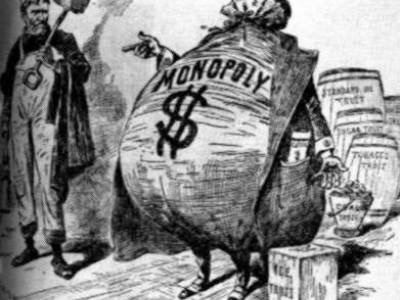In the late 1800s, many industries were controlled by a single company or entity. This allowed the people in control of these industries to profit greatly, but it also made competition among other companies almost impossible. As a result, monopolies would be able to control a great deal of the power in the economy. Smaller businesses were either bought up or put out of business. This proved to be a problem for many reasons: prices for the things owned by these monopolies could be as high as the trust wanted, making it hard for people to afford, allows the workers of that industry to be undercut in wages because there is no other companies to work for, and makes it hard for smaller companies to survive.
The problems that monopolies like Standard Oil and The American Tobacco Company had to be solved or the economic unrest in the country would continue. The solution came from Senator John Sherman who proposed that the companies that made up trusts be outlawed, forcing them to break up into smaller pieces. The act passed in 1890 and created the much needed competition in the economy it was designed to ensure.
While the law was passed way back in 1890, it has become increasingly relevant toady as it seems there are many corporations who have a vast network of control over some industries. With businesses like Google, Facebook, and Amazon becoming more and more influential on our day to day lives, as well as the standing of the global economy, some people are beginning to wonder if these companies should be broken up. This would cause a mad grab for power throughout the tech industry, but it would also offer more options to choose from for consumers. The likelihood of this happening however is low. The reason that the Anti-Trust Act was put into place in the first place was because there was no competition at all at the time. Today, there are at least several different companies you can buy a smart phone from, get a streaming subscription from, or download a social media app.
One of the only companies close to this level of no competition is Facebook who owns the social media apps Facebook, Instagram, and WhatsApp. Owning 3 of the major social media companies in the world would draw attention to the Anti-Trust Act, but when you consider that they are still in direct competition of Twitter, Snapchat, and YouTube, I believe there is enough evidence to say that Facebook is not a monopoly. Another company that is right on the edge of company and monopoly is Disney. Disney owns many entertainment companies such as Pixar, Marvel, Lucasfilm, ESPN. and ABC. A statistic has shown that Disney is responsible for 40% of the content produced in the entertainment industry. As mind-boggling as that statistic is, that still means that 60% of all other entertainment is coming from separate entities, meaning Disney is not a monopoly.
While there are still many powerhouses in our economy today, none compare to those of the late 1800s and I do not believe that any action will be taken against them. As long as there is still competition in the open market, the chance of the US government taking the matter into their own hands is very unlikely.
https://www.investopedia.com/terms/s/sherman-antiturst-act.asp
No comments:
Post a Comment